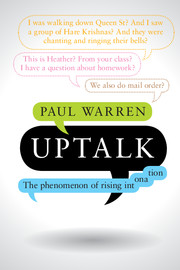Book contents
- Frontmatter
- Dedication
- Contents
- List of figures
- List of tables
- Preface
- Acknowledgements
- List of symbols and abbreviations
- 1 Introduction – why ‘uptalk’?
- 2 The forms of uptalk
- 3 The meanings and functions of uptalk
- 4 Uptalk in English varieties
- 5 Origins and spread of uptalk
- 6 Social and stylistic variation in uptalk use
- 7 Credibility killer and conversational anthrax: uptalk in the media
- 8 Perception studies of uptalk
- 9 Uptalk in other languages
- 10 Methodology in uptalk research
- 11 Summary and prospect
- References
- Index
11 - Summary and prospect
Published online by Cambridge University Press: 05 December 2015
- Frontmatter
- Dedication
- Contents
- List of figures
- List of tables
- Preface
- Acknowledgements
- List of symbols and abbreviations
- 1 Introduction – why ‘uptalk’?
- 2 The forms of uptalk
- 3 The meanings and functions of uptalk
- 4 Uptalk in English varieties
- 5 Origins and spread of uptalk
- 6 Social and stylistic variation in uptalk use
- 7 Credibility killer and conversational anthrax: uptalk in the media
- 8 Perception studies of uptalk
- 9 Uptalk in other languages
- 10 Methodology in uptalk research
- 11 Summary and prospect
- References
- Index
Summary
The aim of this book has been to draw together in one place a range of research findings and other commentary relating to uptalk. Many questions have been asked of uptalk, including what it is, where it has come from and where it will go.
What is uptalk?
There are widely held views that uptalk is the use of question-like intonation with declarative statements, and that speakers use uptalk because they have doubts or insecurities concerning what they are saying, and so are continually questioning their own output. Such views are understandable, since uptalk utterances are marked by a rising intonation pattern, and intonational rises are typically associated with questions. The link between uptalk and questions is perpetuated by much of the public commentary, and lies behind stereotyped interpretations of uptalk as signalling uncertainty or insecurity. This is, however, too narrow and blinkered an approach. First, it ignores many of the meanings claimed for uptalk, which were explored in Chapters 3 and 6. Second, there are formal properties both of uptalk and of questions that call into doubt the claimed equivalences of the two.
With regard to its meaning, it is clear that uptalk is not simply about asking questions. In particular, we find uptalk in contexts where the speaker is the owner of the information being communicated, rather than the seeker of information. This is a reversal of the situations in which we might normally find questions. If there is a questioning aspect to uptalk then it is more an invitation to participate than a request for factual information. It is asking the listener to continue to engage in the interaction, and it does this by checking that the listener is following. For both uptalkers and non-uptalkers, the meanings associated with uptalk are those associated with high intonation, i.e., openness or incompleteness. However, to these different groups, i.e., to the in-group and to the out-group, uptalk can mean different things. The authors of opinion pieces and of letters to the editor who complain about uptalk tend to be members of the out-group.
- Type
- Chapter
- Information
- UptalkThe Phenomenon of Rising Intonation, pp. 187 - 191Publisher: Cambridge University PressPrint publication year: 2016



